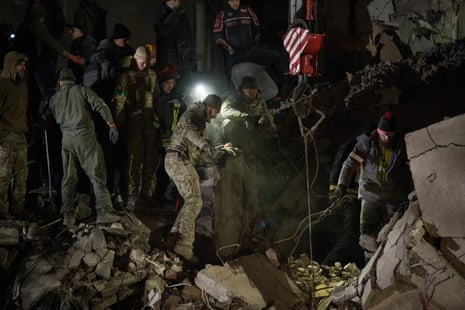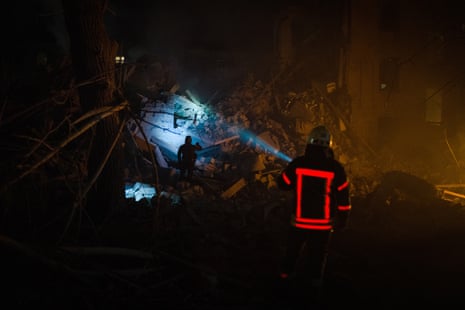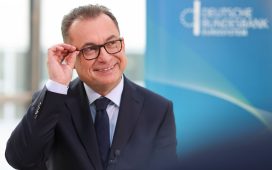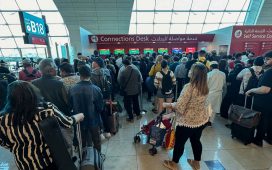Zelenskiy pushes for 10th sanctions package from EU leaders meeting in Kyiv
European Union leaders will meet the Ukrainian president, Volodymyr Zelenskiy, in Kyiv today, bringing the promise of new sanctions against Russia but likely dashing Ukraine’s hope for swift EU membership, Reuters reports.
The head of the group’s executive commission, Ursula von der Leyen, arrived in Kyiv by train on Thursday, a symbolic journey to demonstrate support for Ukraine as the first anniversary of Russia’s 24 February 2022 invasion approaches.
Senior members of the EU’s executive met their counterparts in the Ukrainian government, and von der Leyen and the chairman of the 27 EU national leaders, Charles Michel, will convene talks with Zelenskiy on Friday.
Zelenskiy called for more punitive measures against Russia by the EU, but new sanctions the bloc is preparing for the anniversary will fall short of his government’s demands.
“We see today that the pace of sanctions in Europe has slowed down a little,” Zelensky told a joint news conference alongside European Commission president, Ursula von der Leyen. “The terrorist state increases the pace of adaptation to sanctions instead. It should be resolved. We believe that we can do it together.”
“Russia is paying a heavy price, as our sanctions are eroding its economy, throwing it back by a generation,” Von der Leyen said on Thursday. “By 24 February, exactly one year since the invasion started, we aim to have the 10th package of sanctions in place.”
Key events
Maria Zakharova, the Russian foreign ministry spokesperson, has posted to Telegram, responding to the Ukrainian president’s comments about the slowing down of western sanctions on Russia.
She quotes the media saying “Zelenskiy complained that the pace of sanctions in Europe has slowed down, and Russia has become faster to adapt to restrictions” and goes on to write:
Western Europe, falling into recession, having long lost the habit of survival, is sinking, with Ukraine tied to its feet.
Ukraine’s state broadcaster Suspilne offers this summary of the last 24 hours in its latest bulletin on Telegram. It writes:
At night, the Russian military attacked the Barvinkove community in the Kharkiv region. A private house was destroyed and a 70-year-old man was rescued from the rubble. Two men died.
Also at night, the Russian army shelled Kherson. They hit one of the shopping centres, a fire started there. People were not injured. Nikopol in the Dnipropetrovsk region also came under fire. There are no dead or injured.
Over the past 24 hours, one person was killed by Russian shelling in Donetsk region, and eight others were injured. In the Kherson region, two people were killed in a day, nine more were injured, among them a five-year-old child.
The claims have not been independently verified.
Here are two images sent over the news wires from Kramatorsk, showing search and rescue operations taking place yesterday. Three people died, eight people were hospitalised with injuries, including two who are in a serious condition, after a building was struck by a Russian missile.


Suspilne, Ukraine’s state broadcaster, reports the latest status update from Ukraine’s regional authority in partially occupied Kherson, one of the areas the Russian Federation claims to have annexed. Suspilne posted to its official Telegram channel:
During the day of 2 February, the Russian occupiers shelled Kherson oblast 65 times with artillery, anti-aircraft guns, mortars, and tanks. Kherson – 13 times. They targeted a shipbuilding plant, a school and residential buildings. Two people died, nine were injured. Among the injured was a five-year-old boy.
EU leaders to dampen Ukraine’s hopes of fast-track EU membership

Jennifer Rankin
EU leaders will seek to cool Ukraine’s expectations of a fast track to membership at a summit with Volodymyr Zelenskiy on Friday, as the bloc spars over how much encouragement to give its war-torn neighbour.
The president of the European Commission, Ursula von der Leyen, and the head of the European Council, Charles Michel, are due to meet Zelenskiy in Kyiv on Friday for wide-ranging talks on the war, further sanctions on Russia and integrating Ukraine into the EU’s internal market.
It is understood that the EU leaders will seek in private to temper Ukraine’s expectations of a fast-tracked membership, while avoiding negative public statements that could weaken morale and damage Zelenskiy’s efforts to project a European future for Ukrainians.
Western EU member states are concerned that Kyiv’s expectations on speedy membership talks are unrealistic. Earlier this week, Ukraine’s prime minister, Denys Shmyhal, told Politico his country had “a very ambitious plan to join the European Union within the next two years”.
For this Friday’s must-read: Guardian correspondents have looked into how Putin’s plans to blackmail Europe over gas supply failed:
The worst-case scenarios piled up over the summer months. Germany’s economic minister warned of “catastrophic” industrial shutdowns, fraying supply chains and mass unemployment. France’s president urged citizens to turn down the heating. Spain asked why countries that hadn’t got hooked on Russian gas should bail out neighbours who had lectured them about fiscal discipline in the past.
The former Russian president Dmitry Medvedev, meanwhile, gleefully predicted that Europeans would be “freezing in their homes” because they hadn’t thought through the consequences of throwing their support behind Ukraine. “The cold is coming soon,” he said, menacingly, in June last year.
But as the European Union enters the last month of the meteorological winter in 2023, signs are becoming clearer that its members have weathered a historic crisis – and not just because “General Frost” has proved a milder adversary than Medvedev predicted.
Within eight months of Russian troops setting foot on Ukrainian soil, the bloc of 27 European states replaced about 80% of the natural gas it used to draw through pipelines with Russia, by rapidly building up new infrastructure for liquid natural gas, finding creative ways to help each other out amid shortages, and successfully pursuing energy-saving policies.
Read the full story at the link below:
The US Central Intelligence Agency director, William Burns, said on Thursday that the Chinese president Xi Jinping’s ambitions toward Taiwan should not be underestimated, despite him likely being sobered by the performance of Russia’s military in Ukraine.
Burns said the United States knew “as a matter of intelligence” that Xi had ordered his military to be ready to conduct an invasion of self-governed Taiwan by 2027.
“Now, that does not mean that he’s decided to conduct an invasion in 2027, or any other year, but it’s a reminder of the seriousness of his focus and his ambition,” Burns told an event at Georgetown University in Washington.
“Our assessment at CIA is that I wouldn’t underestimate President Xi’s ambitions with regard to Taiwan,” he said, adding that the Chinese leader was likely “surprised and unsettled” and trying to draw lessons by the “very poor performance” of the Russian military and its weapons systems in Ukraine.
Ukraine’s allies are pushing the International Monetary Fund to finalise plans for a multibillion-dollar lending programme, the Financial Times reported on Friday.
IMF representatives are planning to meet Ukrainian officials in mid-February to advance discussions over a loan that could range from $14bn to $16bn, the report said, citing officials familiar with the talks.
Zelenskiy pushes for 10th sanctions package from EU leaders meeting in Kyiv
European Union leaders will meet the Ukrainian president, Volodymyr Zelenskiy, in Kyiv today, bringing the promise of new sanctions against Russia but likely dashing Ukraine’s hope for swift EU membership, Reuters reports.
The head of the group’s executive commission, Ursula von der Leyen, arrived in Kyiv by train on Thursday, a symbolic journey to demonstrate support for Ukraine as the first anniversary of Russia’s 24 February 2022 invasion approaches.
Senior members of the EU’s executive met their counterparts in the Ukrainian government, and von der Leyen and the chairman of the 27 EU national leaders, Charles Michel, will convene talks with Zelenskiy on Friday.
Zelenskiy called for more punitive measures against Russia by the EU, but new sanctions the bloc is preparing for the anniversary will fall short of his government’s demands.
“We see today that the pace of sanctions in Europe has slowed down a little,” Zelensky told a joint news conference alongside European Commission president, Ursula von der Leyen. “The terrorist state increases the pace of adaptation to sanctions instead. It should be resolved. We believe that we can do it together.”
“Russia is paying a heavy price, as our sanctions are eroding its economy, throwing it back by a generation,” Von der Leyen said on Thursday. “By 24 February, exactly one year since the invasion started, we aim to have the 10th package of sanctions in place.”
Welcome and summary
Hello and welcome to today’s live coverage of the war in Ukraine. My name is Helen Sullivan and I’ll be bringing you the latest for the next while.
Our top story this morning: European Union leaders will meet Volodymyr Zelenskiy in Kyiv on Friday, bringing the promise of new sanctions against Russia but likely dashing Ukraine and its president’s hopes of swift EU membership.
“Russia is paying a heavy price, as our sanctions are eroding its economy, throwing it back by a generation,” Ursula von der Leyen said on Thursday. “By 24 February, exactly one year since the invasion started, we aim to have the 10th package of sanctions in place.”
Here are the other key recent developments – including what has happened so far at the talks between EU leaders and Zelenskiy:
-
The EU has pledged to double a military aid programme for Ukraine by training an extra 15,000 soldiers as part of a blizzard of announcements aimed at showing it will “stand by Ukraine for the long haul”. Speaking at the start of a two-day trip to Kyiv, the European Commission president, Ursula von der Leyen, reiterated that the EU aimed to have a 10th package of sanctions against Russia in place by 24 February.
-
Von der Leyen also reiterated that the EU would cap the price of Russian petroleum products, as part of a broader G7 plan to restrict oil revenues available to the Kremlin’s war machine. The G7 and the EU have already agreed on a price cap on crude oil that came into force last December and, according to Von der Leyen, costs Russia €160m (£143m/$174m) a day. The EU’s 27 member states are yet to agree on the latest oil price cap.
-
The EU also intended to work with Ukrainian prosecutors to set up an international centre for the prosecution of the crime of aggression in Ukraine to be located in The Hague, Von der Leyen said. The purpose of this centre was to collect and store evidence for any future trial, whether that took place via a special tribunal or some other way.
-
The European parliament has voted in support of a roadmap for Ukraine’s accession to the EU. The Ukrainian prime minister, Denys Shmyhal, has said he wanted Ukraine to join the EU in two years, but in reality it was likely to take much longer.
-
Ukraine’s president, Volodymyr Zelenskiy, has urged the EU to impose more sanctions on Russia, and said he had discussed a new sanctions package with Von der Leyen. Zelenskiy said the speed of the EU sanctions campaign against Russia had “slightly slowed down” while Russia had been “increasing its pace of adapting to sanctions”.
-
The British prime minister, Rishi Sunak, said sending fighter jets to Ukraine would require “months if not years” of training and that he was looking for the most effective way of helping Kyiv secure victory.
-
Russia is planning a major offensive to coincide with the one-year anniversary of the war in Ukraine on 24 February, according to Ukraine’s defence minister. Speaking to French media, Oleksii Reznikov said Russia would call on a large contingent of mobilised troops. Referring to the general mobilisation of 300,000 conscripted soldiers in September, he claimed that numbers at the border suggest the true size could be closer to 500,000.
-
Russia has warned it has “the potential” to respond to western arms deliveries to Ukraine that will not just be about “using armoured vehicles”. In a speech marking the 80th anniversary of the Soviet victory against Nazi Germany in the Battle of Stalingrad, Vladimir Putin appeared to allude to Russia’s enormous nuclear weapons arsenal, warning that “those who expect to win on the battlefield apparently do not understand that a modern war with Russia will be utterly different for them”.
-
Former Russian president Dmitry Medvedev has said Russia’s arms suppliers will “significantly” increase their deliveries of military hardware during this year. Medvedev, who is deputy chairman of Russia’s powerful security council and oversees a government commission on arms production, said new supplies would help Russia inflict a “crushing defeat” over Ukraine on the battlefield.
-
Two Russian missiles struck Kramatorsk on Thursday, after an apartment block in the eastern Ukrainian city was hit on Wednesday night, killing at least killing three people and injuring 20. The latest strikes resulted in civilian casualties, said the head of the regional military administration, Pavlo Kyrylenko, but it was not clear how many. In addition, two people were killed by Russian shelling in the southern Kherson region.
-
At least eight people died after a fire at a dormitory for construction workers in the Crimean city of Sevastopol, Russian officials said. The fire broke out in temporary accommodation for workers building the Tavrida highway, a road linking the cities of Sevastopol and Simferopol, according to the Russia-installed governor of Sevastopol.
-
Russia’s foreign minister, Sergei Lavrov, said everybody wanted the conflict in Ukraine to end, but that the west’s support for Kyiv was playing an important role in how Moscow approached the campaign. In an interview on Russia’s state TV, Lavrov also said Moscow had plans to overshadow pro-Ukrainian events arranged by western and allied countries around the world to mark the invasion of Ukraine on 24 February.
-
A senior Russian lieutenant who fled after serving in Ukraine has described how his country’s troops tortured prisoners of war and threatened some with rape. “I have personally seen our troops torture Ukrainian soldiers,” Konstantin Yefremov, who is the most senior soldier to speak out against the war, told the Guardian in a phone call. “I feel relieved that I can finally speak out about the things I have seen.”
-
A state-of-the-art missile defence system provided by Italy and France should be up and running in Ukraine within the next two months, Italy’s foreign minister, Antonio Tajani, has said. France and Italy agreed to supply their SAMP/T air defence system to Ukraine, on Kyiv’s request, to help protect the country’s critical infrastructure and cities from the regular barrage of Russian missiles hitting Ukraine.
-
Poland’s prime minister, Mateusz Morawiecki, has said he is open to supplying Ukraine with F-16 fighter jets if the decision is taken together with Nato allies. In an interview with Bild, he stressed that his assessment was “based on what Nato countries decide together” and that the decision required the “strategic consideration of the whole” alliance.















